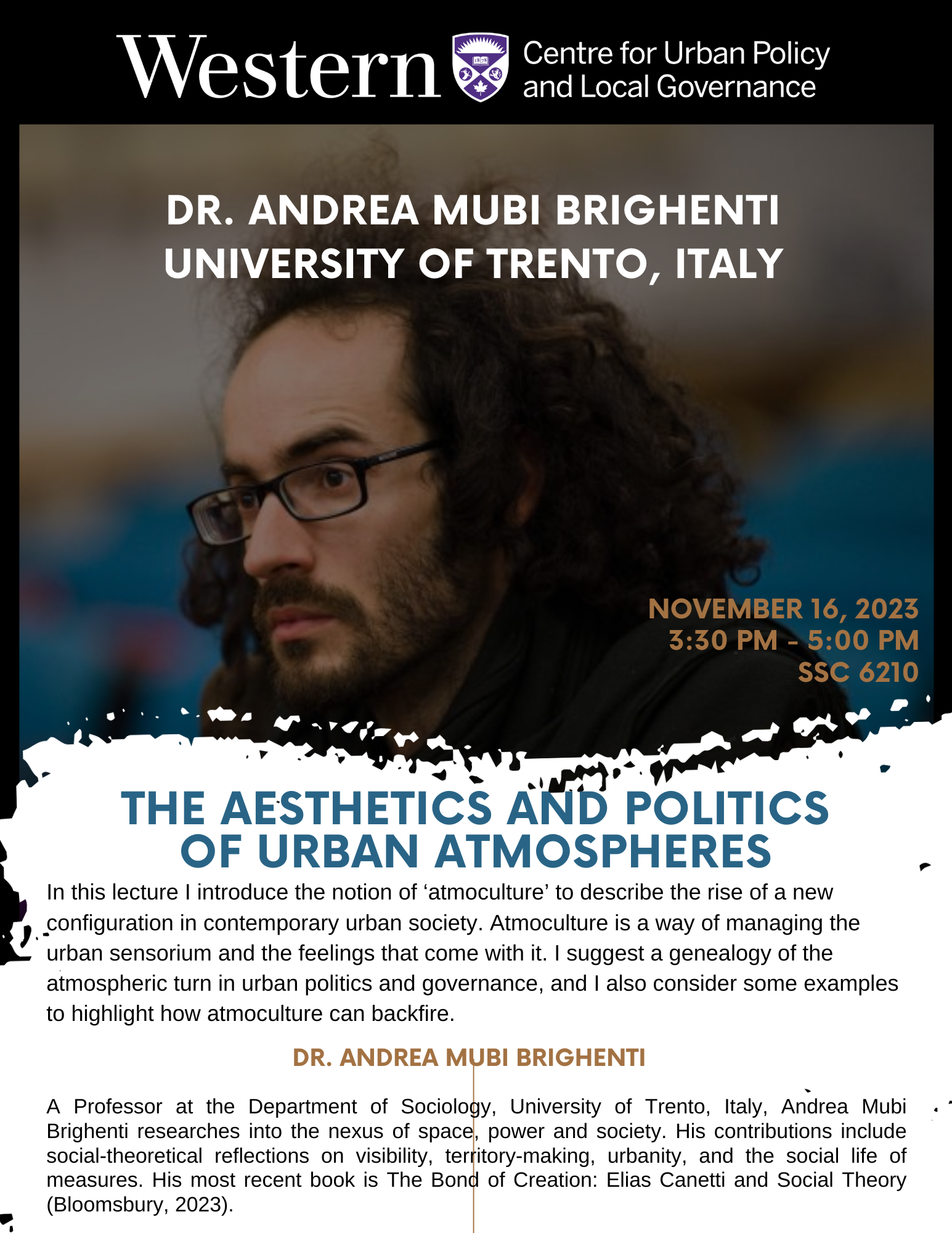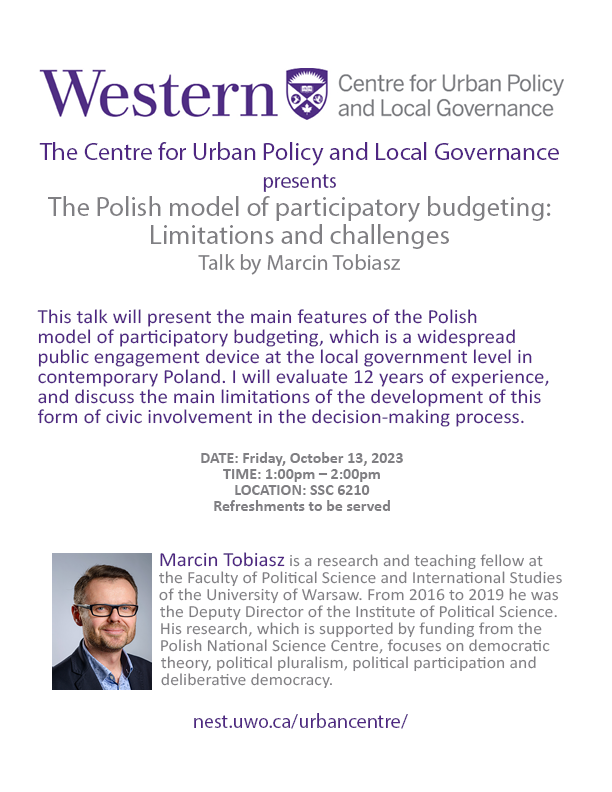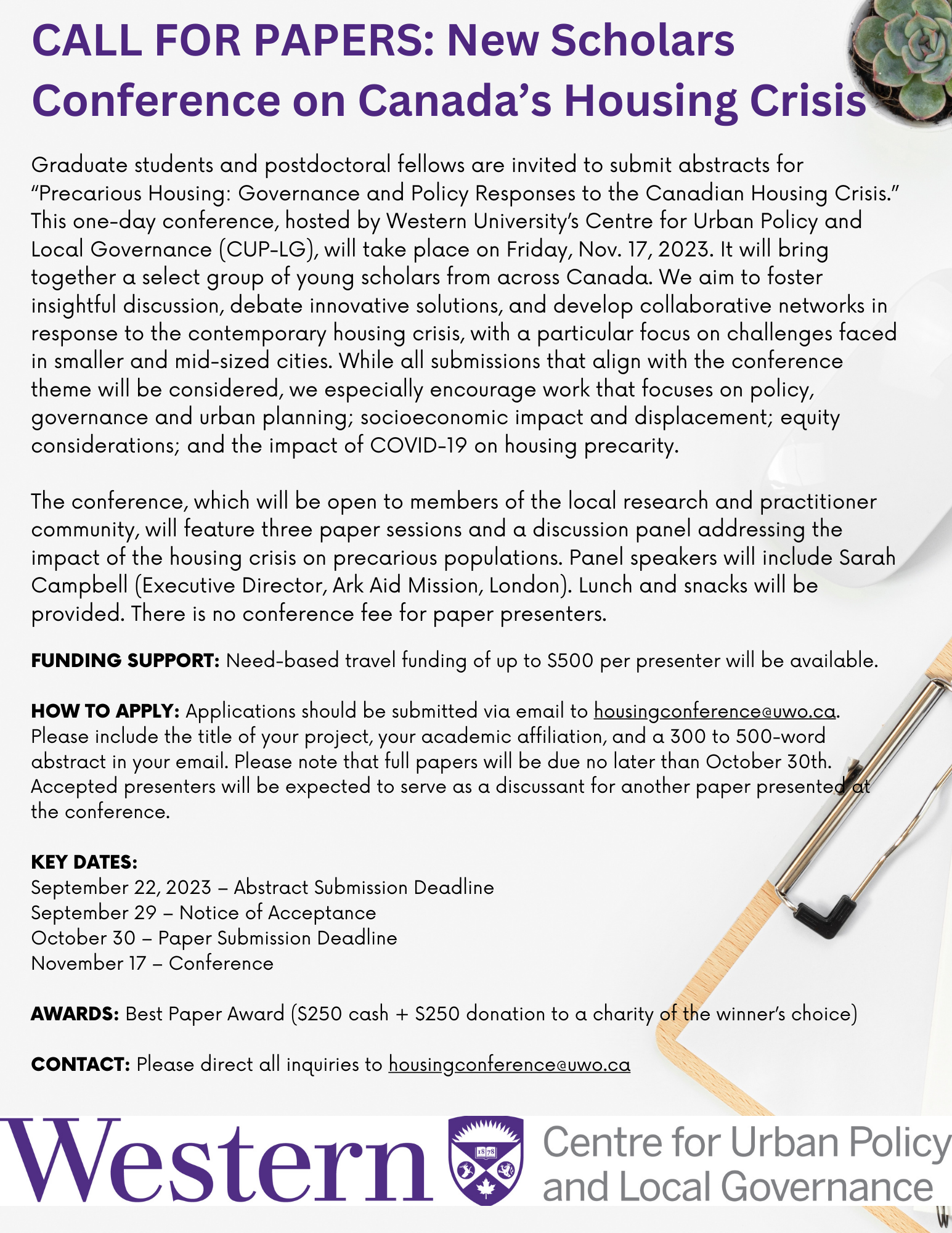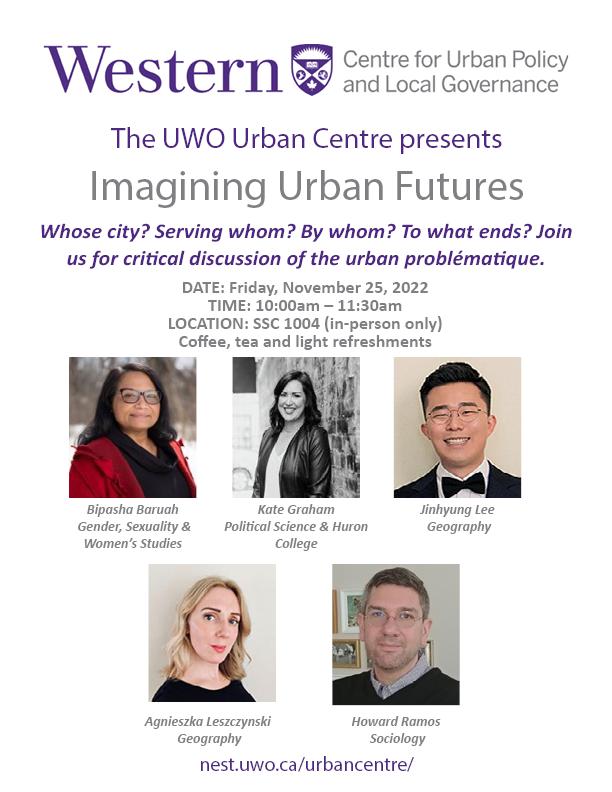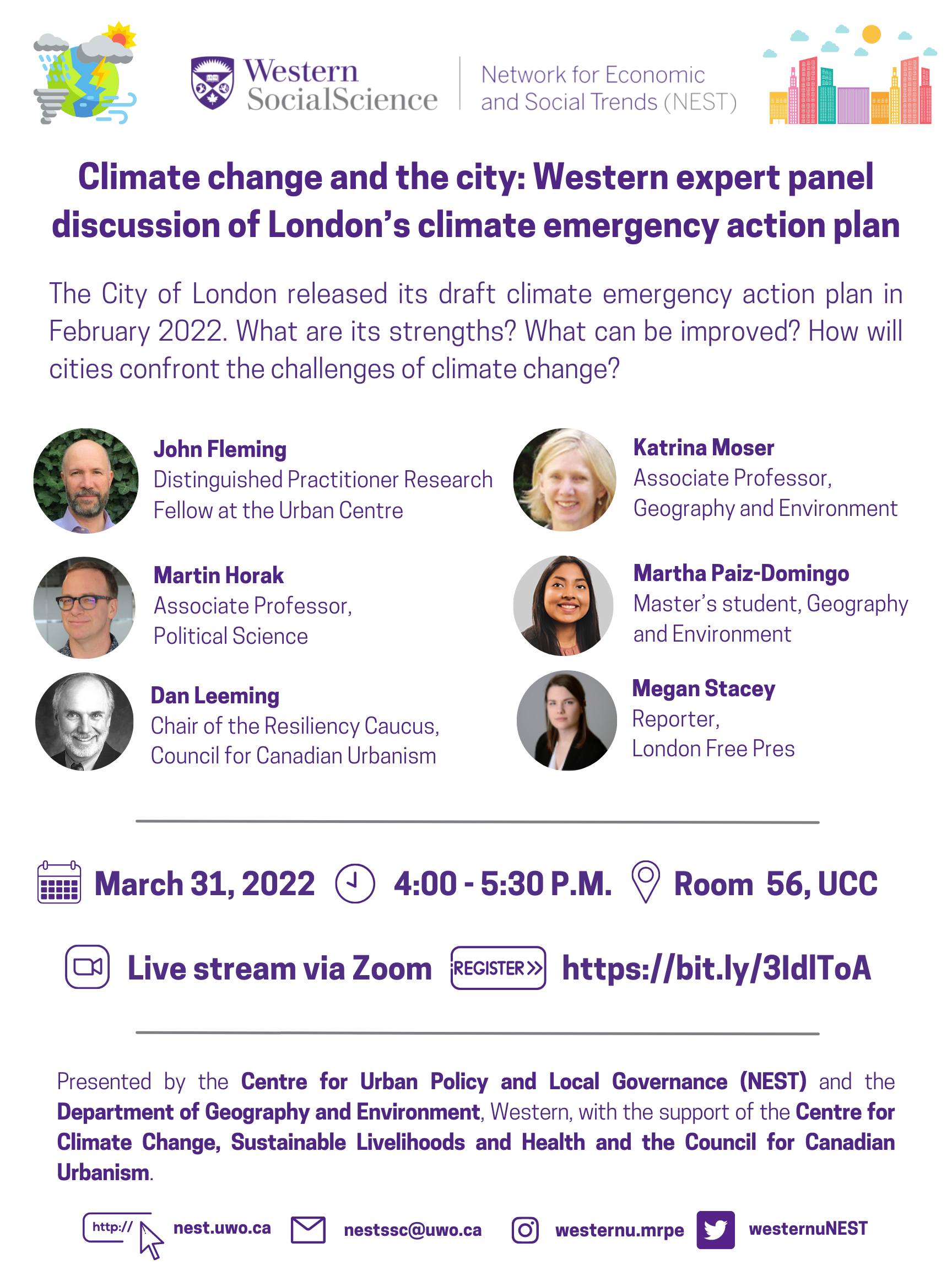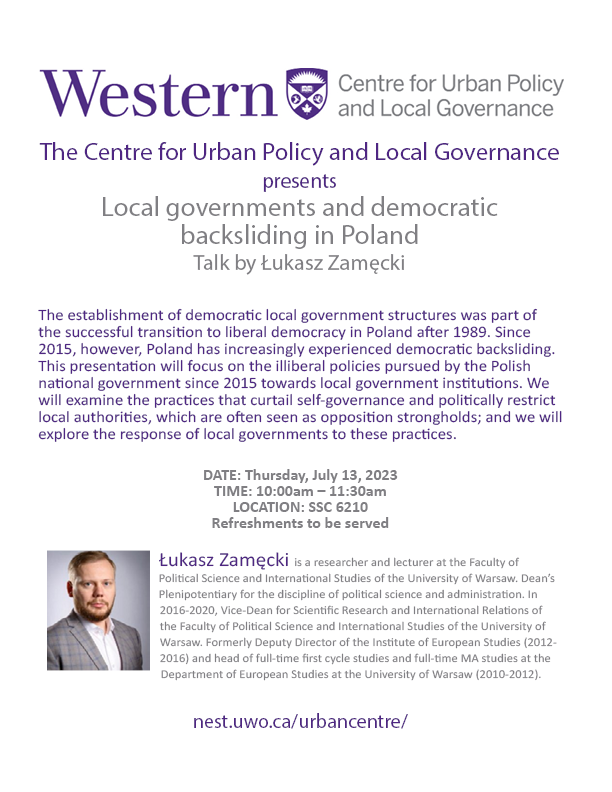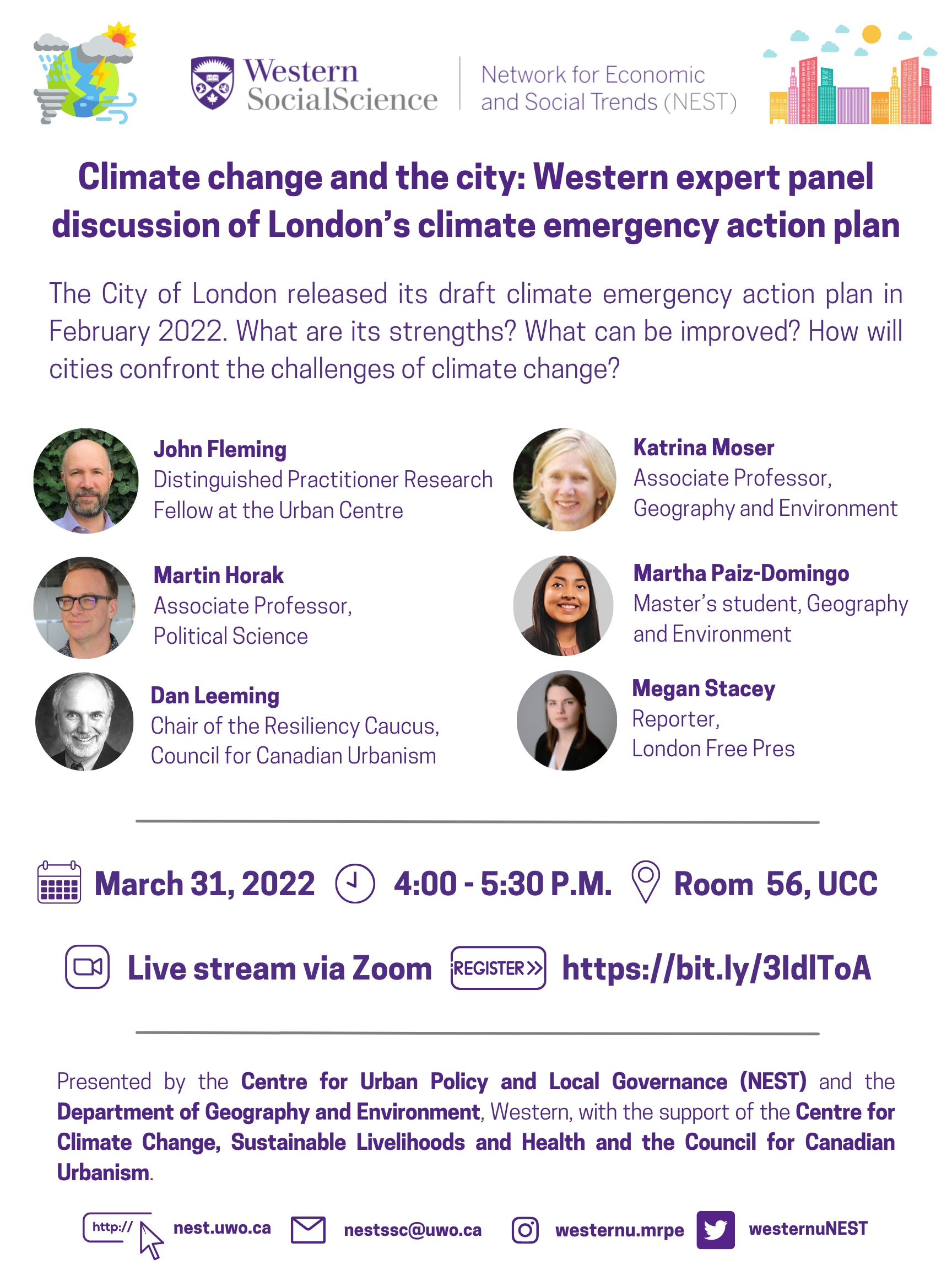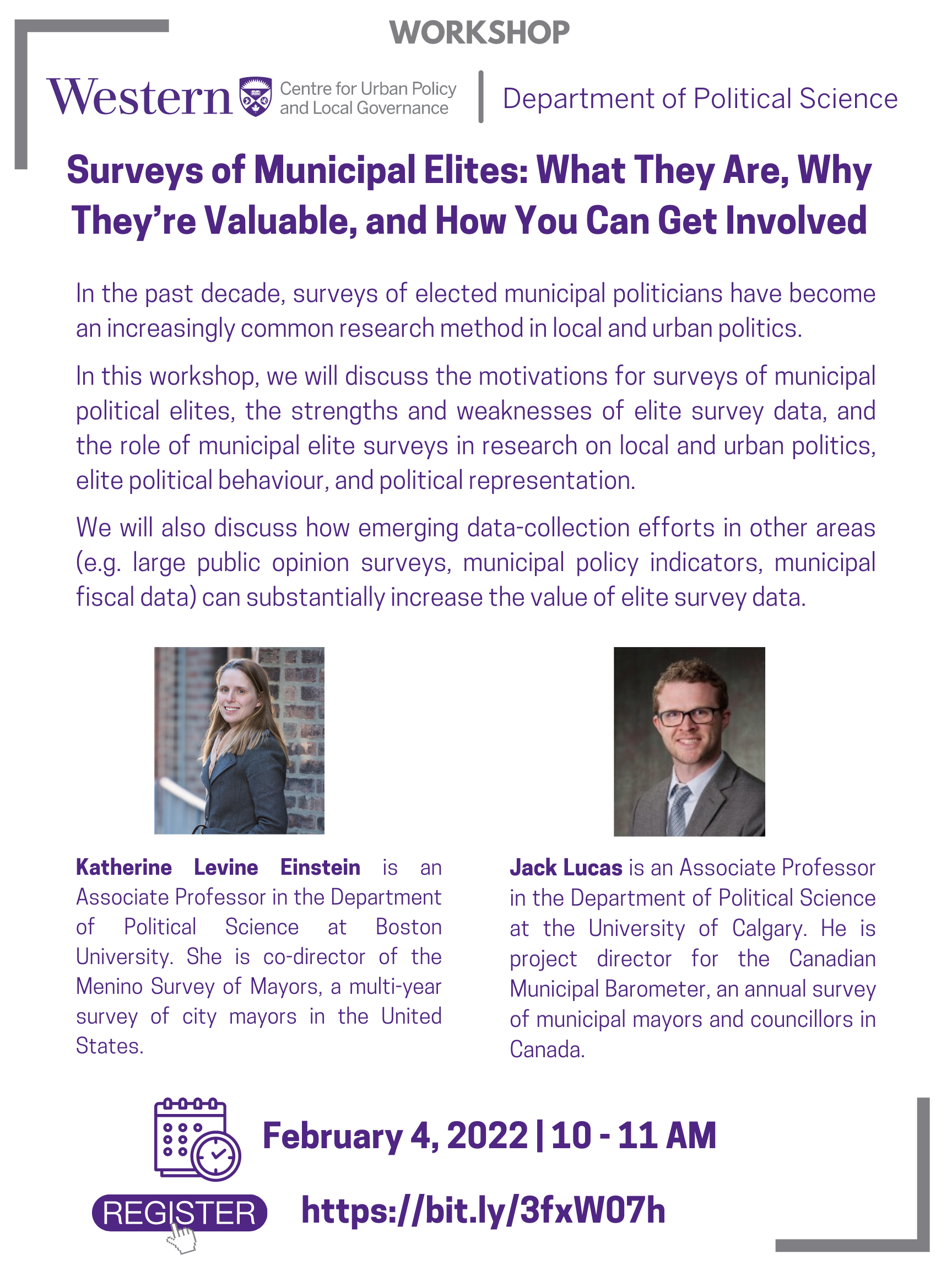News and Events
Events
Jul. 24, 2024, 11:00AM - Gonzalez Medina, Metropolitan Governance in Spain: The case of Madrid

Although metropolitan areas are recognized legal entities in Spain, few exist in practice. Unlike most other large European cities, Madrid - the largest urban area in Spain and one of the most populated in Europe - lacks metropolitan institutions. This seminar will analyze why this is so, why the issue is on the current political agenda, and what factors facilitate and/or hinder the constitution of metropolitan governance in Madrid.
Moneyba Gonzalez Medina , PhD at Universidad Autónoma de Madrid
Apr. 12, 2024, 10:30AM – Talk by Caroline Schulte Oestrich on the Impact of Local Governments on Sustainable Transportation in Germany
 As transportation continues to be reponsible for a large proportion of greenhouse gas emissions, the switch to alternative means of transport is an important issue in the German debate on climate protection. The talk will focus on the role of local governments in implementing new transportation models and existing approaches in Germany.
As transportation continues to be reponsible for a large proportion of greenhouse gas emissions, the switch to alternative means of transport is an important issue in the German debate on climate protection. The talk will focus on the role of local governments in implementing new transportation models and existing approaches in Germany.
Caroline is a doctoral candidate and reseach assistant at Ludwig-Maximillians-Universität München.
News Archive
2024–2025
Prof. Taylor appointed editor-in-chief of journal
TPG journal coverOn July 1, 2024, Prof. Zack Taylor, Dept. of Political Science, was appointed to a five-year term (2024–29) as editor-in-chief of Territory, Politics, Governance, an international, interdisciplinary journal published by the Regional Studies Association. The journal is committed to the development of theory and research on territorial politics and the governance of space and the publication of original, high-quality international scholarship that advances this growing field of research. Prof. Taylor will serve on the board of the Regional Studies Association during his tenure as the journal's editor-in-chief.
Canadian Municipal Attributes Portal (CMAP)
On July 4, 2024, WesternUrban updated the Canadian Municipal Attributes Portal (CMAP), an interactive app that presents information no how governance is structured in almost 200 municipalities across Canada in which 73% of the country's population lives. The database includes data on dozens of key institutional attributes, ranging from electoral systems and council structure to the governance of service provision. Users can compare municipalities and visualize patterns across provinces and municipal population size. You can access CMAP at https://westernurban.shinyapps.io/CMAP/.
2023–2024
Mar. 1, 2024, 2:00PM – NEST Distinguished Speaker Series – Jason Hackworth on The Myth of the North American City Revisited: Explorign the Role of Race and Racism in Canadian Cities
 Goldberg and Mercer's The Myth of the North American City has become a classic in Canadian geography, planning, and sociology circles since it's publication over 40 years ago. In it, the authors provide compelling evidence for contrast between American and Canadian cities. Race and racism are among the many dimensions they explore. In their narrative, they argue that American cities are deeply affected by racism and Canadian cities much less so (or not at all) more recently other scholars in geography, sociology, and area studies have used the American experience of racism to highlight patterns in other non-American Global North locations – France, New Zealand, Italy, Germany, among others. This lecture focusses on the opportunities and challenges of applying, rather than juxtaposing as the myth and other similar writings do, the lessons of American racism to the urban context.
Goldberg and Mercer's The Myth of the North American City has become a classic in Canadian geography, planning, and sociology circles since it's publication over 40 years ago. In it, the authors provide compelling evidence for contrast between American and Canadian cities. Race and racism are among the many dimensions they explore. In their narrative, they argue that American cities are deeply affected by racism and Canadian cities much less so (or not at all) more recently other scholars in geography, sociology, and area studies have used the American experience of racism to highlight patterns in other non-American Global North locations – France, New Zealand, Italy, Germany, among others. This lecture focusses on the opportunities and challenges of applying, rather than juxtaposing as the myth and other similar writings do, the lessons of American racism to the urban context.
Jason Hackworth is a professor of planning and geography at the University of Toronto. He has written three books and numerous articles on the roll of economics, race, and policy at shaping North American cities.
Dec. 15, 2023, 10:30AM – Talk by Ester Marco Penãs and Félix Alberto Vega Borrego on the Financing of Municipal Services in Spain Through User Fees
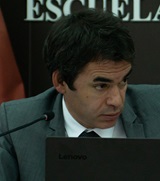
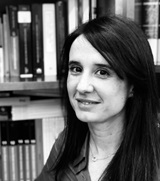 This talk will address some of the problems posed by the financing of municipal services in Spain through user fees. Many of these problems are not unique to the Spanish context. Subjects include debates concerning the power of municipalities to set user fee rates; whether user fee should be linked to an individuals ability to pay; appropriateness of fees for financing of services and urban development; and the relationship between the legal framework for user fees, and the processes through which services are managed at the local level.
This talk will address some of the problems posed by the financing of municipal services in Spain through user fees. Many of these problems are not unique to the Spanish context. Subjects include debates concerning the power of municipalities to set user fee rates; whether user fee should be linked to an individuals ability to pay; appropriateness of fees for financing of services and urban development; and the relationship between the legal framework for user fees, and the processes through which services are managed at the local level.
Ester Marco Penãs and Félix Alberto Vega Borrego are Professors of Tax Law at the Universidad Autonomá de Madrid.
TALK IN-PERSON – NOV. 16, 2023 – 3:30PM
Oct. 13, 2023 – 1:00PM
CALL FOR PAPERS: New Scholars Conference on Canada’s Housing Crisis
Metropolitan Governance Panel at University of Toronto
Prof. Zack Taylor of the Department of Political Science and Local Government Program participated in a panel discussion on “Making the Case for Regionalism” hosted by the University of Toronto’s School of Cities in partnership with Institute on Municipal Finance and Governance (IMFG). The event reviewed the need for coordinating structures, tools, and resources that cities can use to act regionally, compete with other global city-regions, and improve the social and economic outcomes of residents.
Speakers:
- Don Iveson, 35th Mayor of Edmonton, former Chair of Canada’s Big City Mayors, and Canadian Urban Leader at the University of Toronto’s School of Cities.
- Jen Nelles, Senior Research Fellow with the Innovation Caucus and co-director of the Oxford Regions, Innovation, and Enterprise Lab (ORIEL), Oxford Brookes Business School, United Kingdom.
- Zack Taylor, Associate Professor, Dept. of Political Science and Local Government Program, Western University.
The hybrid event will occur on January 17, 2023 from 5:30–7:30pm at the Campbell Conference Centre in the Munk School of Global Affairs and Public Policy, University of Toronto.
EXPERT PANEL DISCUSSION - NOV. 25, 2022 - 10:00AM
EXPERT PANEL DISCUSSION - MAR. 31, 2022 - 4:00PM
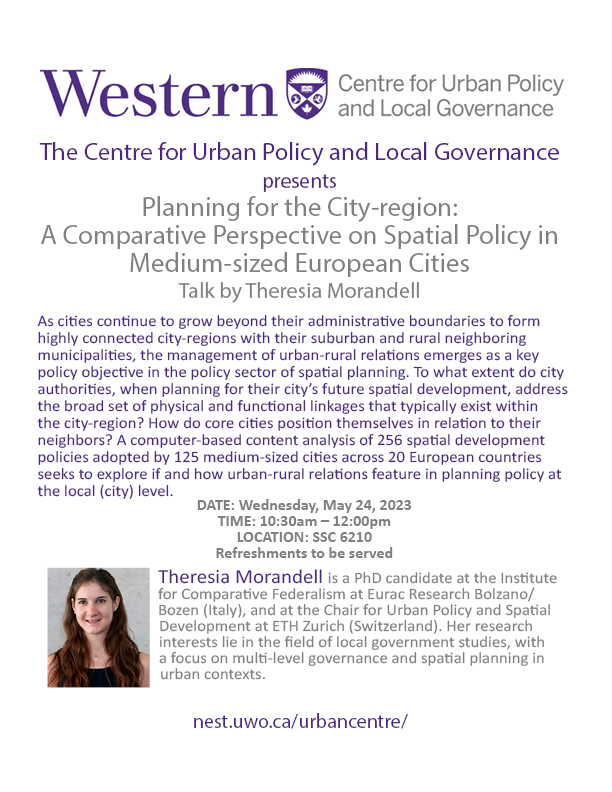
2022–2023
Metropolitan Governance Panel at University of Toronto
Prof. Zack Taylor of the Department of Political Science and Local Government Program will participate in a panel discussion on “Making the Case for Regionalism” hosted by the University of Toronto’s School of Cities in partnership with Institute on Municipal Finance and Governance (IMFG). The event will review the need for coordinating structures, tools, and resources that cities can use to act regionally, compete with other global city-regions, and improve the social and economic outcomes of residents.
Speakers:
- Don Iveson, 35th Mayor of Edmonton, former Chair of Canada’s Big City Mayors, and Canadian Urban Leader at the University of Toronto’s School of Cities.
- Jen Nelles, Senior Research Fellow with the Innovation Caucus and co-director of the Oxford Regions, Innovation, and Enterprise Lab (ORIEL), Oxford Brookes Business School, United Kingdom.
- Zack Taylor, Associate Professor, Dept. of Political Science and Local Government Program, Western University.
The hybrid event will occur on January 17, 2023 from 5:30–7:30pm at the Campbell Conference Centre in the Munk School of Global Affairs and Public Policy, University of Toronto. Participants can also join on-line. Register at: https://www.eventbrite.ca/e/making-the-case-for-regionalism-tickets-474124538257.
LoGov-RISE
The Centre is Canada’s participant in developing a multi-national project on Local Government and the Changing Urban-Rural Interplay. Each country’s research team will study the responsibilities of different levels of government, financial arrangements, and public participation in relation to the growing gap between urban and rural settlements, and to identify innovative practices to respond to these challenges. Prof. Martin Horak is leading this project. Housed at the Institute for Comparative Federalism at Eurac Research, Bolzano, Italy, the LoGov project has received funding from the European Union’s Horizon 2020 Research and Innovation Staff Exchange (MSCA-RISE) programme.
2022 LoGov-RISE Visiting Scholars
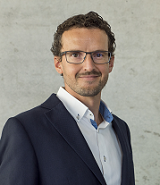 Karl Kössler (Visiting Researcher, June - August 2022)
Karl Kössler (Visiting Researcher, June - August 2022)
Dr. Karl Kössler is Research Group Leader at the Institute for Comparative Federalism of Eurac Research Bolzano/ Bozen, Italy. In 2018, he was appointed as Member of the Council of Europe’s Group of Independent Experts on the European Charter of Local Self- Government. Since 2019, he has been the Scientific Coordinator of the five- year EU Horizon 2020 project “Local Government and the Changing Urban- Rural Interplay (LoGov)”.
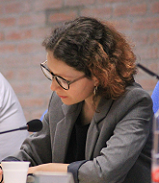 Alicia Sevillano (Visiting Researcher, July - August 2022)
Alicia Sevillano (Visiting Researcher, July - August 2022)
Alicia Sevillano is a PhD candidate awarded a grant from the Spanish Ministry for Universities. She holds a BA in Philosophy, Politics and Economics (Pompeu Fabra University of Barcelona, 2020) and a MA in Democracy and Government (Autonomous University of Madrid, 2021). She is pursuing her PhD at the Local Law Institute (Autonomous University of Madrid), focusing her research on metropolitan governance.
 Malin Nischwitz (Visiting Researcher, August - September 2022)
Malin Nischwitz (Visiting Researcher, August - September 2022)
Malin Nischwitz is a fully qualified lawyer and PhD candidate at the Institute for Politics and Public Law (University of Munich). Since 2020, she has been academic councilor and lecturer at the Chair of Public Law, Business Administrative Law, Environmental and Social Security Law (University of Munich). Her research focus lies on climate change as a challenge for municipalities.

Carmen Navarro (Visiting Researcher, October - November 2022)
Carmen Navarro is associate Professor at the Department of Political Science, University Autónoma of Madrid - UAM, where she focuses her research and teaching in local government and public policy. She is the author of several books and articles in international journals of reference. She has worked on international research projects on local political leadership, metropolitan areas, local assemblies and local autonomy. Since 2019 she is the Vice-Director of the Institute on Local Government and Law IDL-UAM and since 2020 she is the Scientific Coordinator of the Research Project "Public Policies and Services to tackle Depopulation".
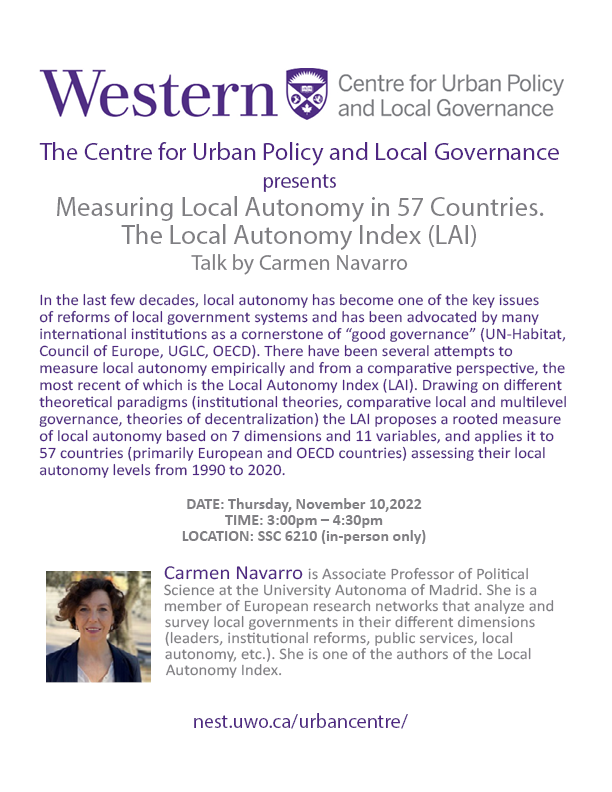
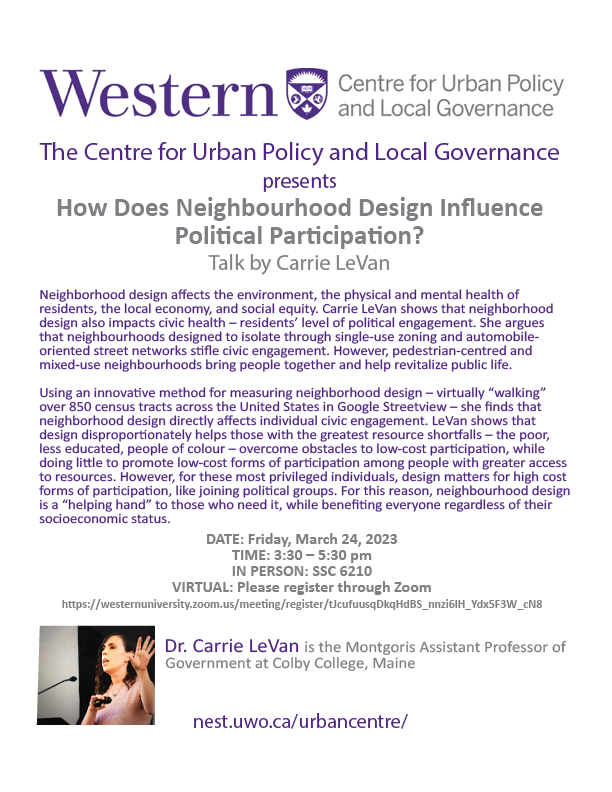
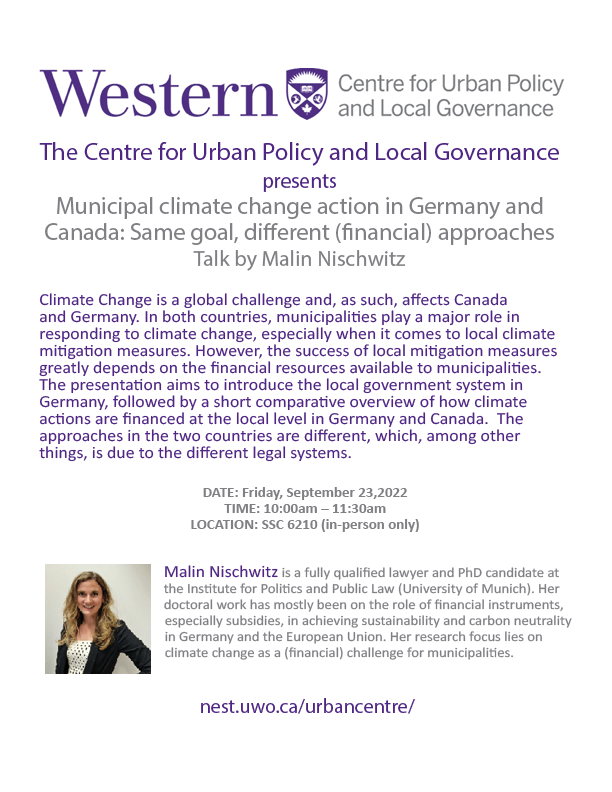
Urban Centre will host the Money and Local Democracy Project | June 2022
The Centre for Urban Policy and Local Governance will host the Money and Local Democracy Project / Projet sur l’argent et la democratie locale, a five-year project investigating municipal campaign finance regulation and local election campaigning. Funded by a SSHRC Insight Grant following pilot work funded by Western Faculty of Social Science research seed grants, the project is led by Western Political Science Professors Zack Taylor and Martin Horak; Sandra Breux at l’Institut national de la recherche scientifique, Montréal; and Kristin Good at Dalhousie University. This mixed-methods project will entail the largest survey of election candidates ever conducted in Canada – over 4,000 candidates in 183 municipalities in all 10 provinces, which are home to four out of five Canadians – as well as analysis of candidates’ campaign finance disclosures over three election cycles and in-depth interviews with former candidates and campaign managers. The project will contribute new insights, both nationally and internationally, into whether differently configured campaign finance regimes create more competitive elections, how local candidates campaign, and enduring questions regarding the influence of money in politics.
2021–2022
VIRTUAL LECTURE – APR. 8, 2022 – 10:30AM
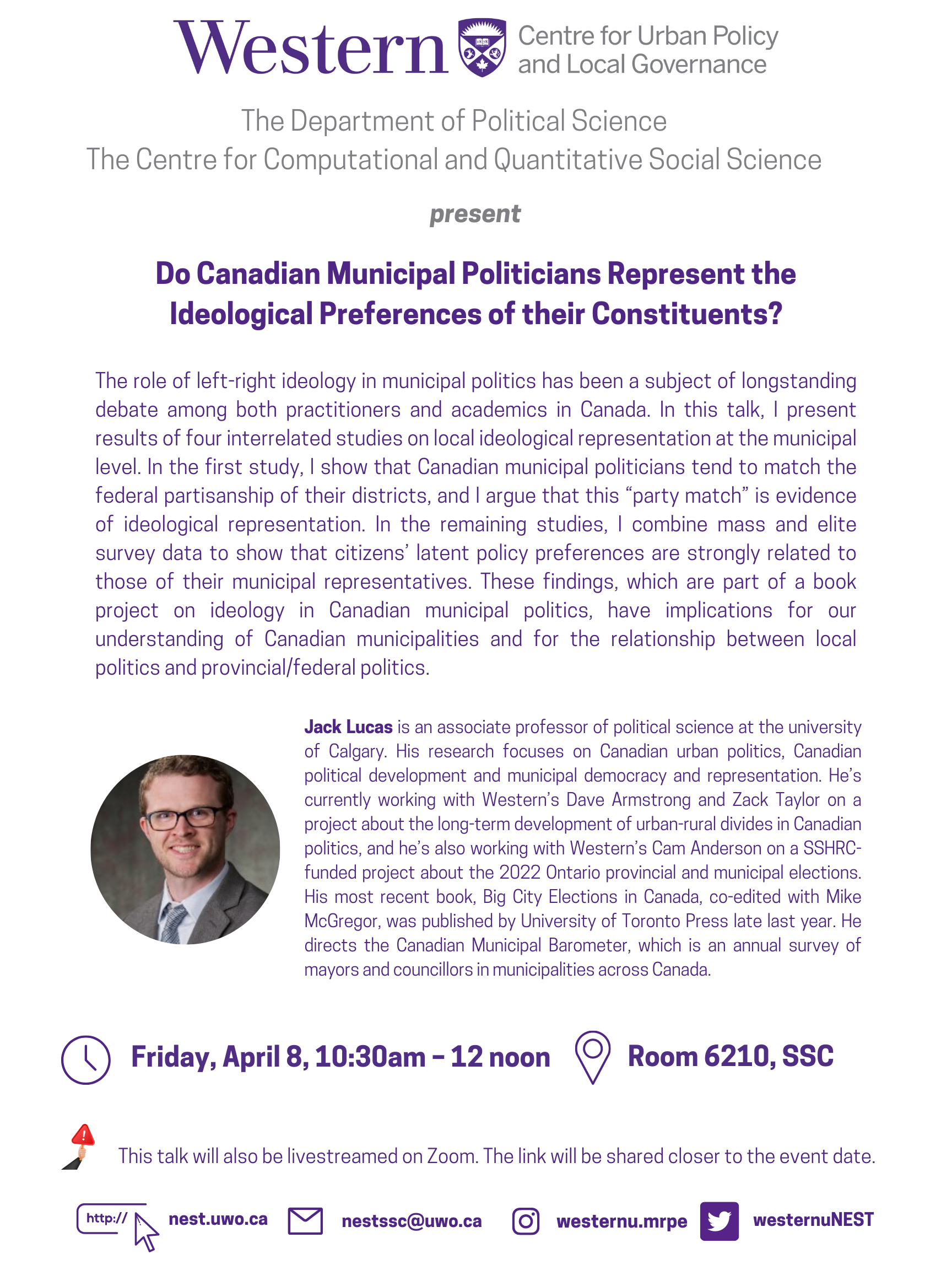
EXPERT PANEL DISCUSSION - MAR. 31, 2022 - 4:00PM
VIRTUAL LECTURE – FEB. 4, 2022 – 1PM
Community Engagement in Housing Politics: Political Inequality and the Challenges of Reforming Local Government
Housing costs are skyrocketing in many American cities. In this talk, I explore how political inequality in local politics makes it difficult to build new housing and reform housing policy. Using a mix of novel administrative data, in-depth interviews, and archival evidence, I find that local policies amplify the voices of older, privileged homeowners - and that reforming these policies is extraordinarily difficult.
 Dr. Katherine Levin Einstein is an associate professor of political science at Boston University and a faculty fellow at the Initiative on Cities. Her research and teaching interests broadly include urban politics and policy, racial and ethnic politics, and American public policy. She is one of the authors of Neighborhood Defenders: Participatory Politics and America's Housing Crisis (Cambridge University Press, 2019). Her articles have also appeared in multiple peer-reviewed outlets including the American Journal of Political Science, Perspectives on Politics, Political Behavior, and the Urban Affairs Review. She currently is one of the principal investigators of the Menino Survey of Mayors, a multi-year survey of U.S. mayors exploring a wide spectrum of political and policy issues. Her research has been supported by grants from the National Science Foundation, Russell Sage Foundation, and Rockefeller Foundation.
Dr. Katherine Levin Einstein is an associate professor of political science at Boston University and a faculty fellow at the Initiative on Cities. Her research and teaching interests broadly include urban politics and policy, racial and ethnic politics, and American public policy. She is one of the authors of Neighborhood Defenders: Participatory Politics and America's Housing Crisis (Cambridge University Press, 2019). Her articles have also appeared in multiple peer-reviewed outlets including the American Journal of Political Science, Perspectives on Politics, Political Behavior, and the Urban Affairs Review. She currently is one of the principal investigators of the Menino Survey of Mayors, a multi-year survey of U.S. mayors exploring a wide spectrum of political and policy issues. Her research has been supported by grants from the National Science Foundation, Russell Sage Foundation, and Rockefeller Foundation.
WORKSHOP - FEB. 4, 2022 - 10AM
Katherine Levine Einstein - Menino Survey of Mayors (slides)
Jack Lucas - Canadian Municipal Barometer (slides)
NEW PUBLICATION
New report on the perverse effects of urban development financing in Canada
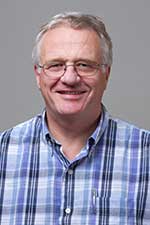 We are pleased to announce the launch of a new report by Professor Emeritus Andrew Sancton entitled Reassessing the Case for Development Charges in Canadian Municipalities. On the basis that “growth should pay for growth,” municipalities levy development charges to cover the cost of new infrastructure. They are paid by property developers on completion of projects and most agree that they are passed on to new home buyers. They have been widely criticized for driving up housing prices in hot housing markets such as the Greater Toronto Area and Metro Vancouver. Indeed, development charges add as much as $90,000 to the cost of a new house in some parts of the GTA, adding to the housing unaffordability crisis.
We are pleased to announce the launch of a new report by Professor Emeritus Andrew Sancton entitled Reassessing the Case for Development Charges in Canadian Municipalities. On the basis that “growth should pay for growth,” municipalities levy development charges to cover the cost of new infrastructure. They are paid by property developers on completion of projects and most agree that they are passed on to new home buyers. They have been widely criticized for driving up housing prices in hot housing markets such as the Greater Toronto Area and Metro Vancouver. Indeed, development charges add as much as $90,000 to the cost of a new house in some parts of the GTA, adding to the housing unaffordability crisis.
The report outlines the history of development charges and shows that arguments commonly made in their favour rely on faulty assumptions. He goes on to examine how growth-related infrastructure is financed in other jurisdictions, including Quebec, the United Kingdom, France, and Germany, indicating that other approaches exist.
A virtual launch event with Prof. Sancton in conversation with the Centre's Distinguished Research Practitioner John Fleming was held on Monday, October 18, 2021, with 70 people attending. A video of the event is available here.
VIRTUAL LECTURE – DEC. 6, 2021
The slow dispossession of home: Migrants and minorities in Britain and implications for local governance
Dr. Nissa Finney, Professor of Human Geography, University of St. Andrews, Scotland
There has been slow dispossession of home for migrants and minorities in Britain that constitutes both social and spatial injustice. This process, which has been exacerbated by the pandemic, has occurred through changes to housing provision and exclusions within housing systems which continue to drive housing deprivation for minorities. To make this argument, Prof. Finney draws on innovative mixed-methods research conducted by the Centre on Dynamics of Ethnicity (CoDE) since 2015. This includes qualitative research with ethnic minority residents and actors involved in social housing provision in urban peripheries of Glasgow and Manchester including neighbourhoods that have experienced demolition and regeneration; analysis of Census data, including for small areas; and early ‘first view’ analysis of the Evidence of Equality National Survey (EVENS), a new survey undertaken by CoDE in 2021 that is the largest and most comprehensive contemporary survey documenting the experiences of ethnic and religious minorities in Britain. Prof. Finney reflected on the implications for local governance in a context of national and regional devolution in the UK.
 Dr. Nissa Finney is Professor of Human Geography at the University of St Andrews. Her work specialises in neighbourhood change, residential mobility, and housing experiences within an overarching framework of social and spatial justice. Much of Nissa’s work considers race and ethnicity, and uses mixed methods approaches. Nissa is a member of the ESRC Centre for Population Change and a founding member of the ESRC Centre on the Dynamics of Ethnicity.
Dr. Nissa Finney is Professor of Human Geography at the University of St Andrews. Her work specialises in neighbourhood change, residential mobility, and housing experiences within an overarching framework of social and spatial justice. Much of Nissa’s work considers race and ethnicity, and uses mixed methods approaches. Nissa is a member of the ESRC Centre for Population Change and a founding member of the ESRC Centre on the Dynamics of Ethnicity.
Professor Emeritus Andrew Sancton publishes article on infrastructure finance
Professor Emeritus Andrew Sancton has published a new article, “Reassessing the Case for Development Charges in Canadian Municipalities,” in the journal Canadian Planning and Policy. In it he challenges dominant thinking about how new urban infrastructure should be financed, that “growth should pay for growth.” Instead, drawing on the experience of other jurisdictions, he argues that the costs of growth-related infrastructure and facilities should mostly be funded by taxpayers, who collectively benefit from urban agglomeration. As development charges constitute a substantial portion of the cost of new housing in Ontario, this would likely improve housing affordability. The article is based on a research report by Sancton published by Western’s Centre for Urban Policy and Local Governance in 2021.
Alumnus Jon Taylor publishes article on local governance reform in New Brunswick
Former political science MA student Jon Taylor (2020–21) has published an article in Canadian Political Science Review based on his final major research paper, which was supervised by Prof. Zack Taylor. Entitled “From Tinkering to Transformation: Gradual Institutional Change in New Brunswick’s Local Governance System,” the article analyzes the history of local governance reform in New Brunswick. The article complements his report Representative Regionalization: Toward More Equitable, Democratic, Responsive, and Efficient Local Government in New Brunswick, coauthored with professor Zack Taylor and published in English and French by Western’s Centre for Urban Policy and Local Governance in May 2021.
2020–2021
APPOINTMENT
City-builder John Fleming joins Western’s Centre for Urban Policy and Local Governance
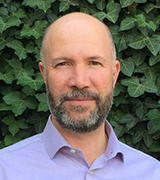 The Centre is excited to welcome nationally recognized urban planner John M. Fleming as a Distinguished Practitioner Research Fellow. Over the next two years, John will build on his significant professional experience to carry out research on local governance, civic engagement, and policy making in the field of city building and design. He will also collaborate with faculty and mentor students.
The Centre is excited to welcome nationally recognized urban planner John M. Fleming as a Distinguished Practitioner Research Fellow. Over the next two years, John will build on his significant professional experience to carry out research on local governance, civic engagement, and policy making in the field of city building and design. He will also collaborate with faculty and mentor students.
Mr. Fleming said, “I’m thrilled to be joining the scholarly community at the Centre for Urban Policy and Local Governance at Western. During my 30 years in professional practice, I’ve had lots of revealing and inspiring conversations about city building and design with members of the community, as well as planning and design colleagues from across the country. These conversations have led me to the Centre with the goal of undertaking research that can play a meaningful role in moving the profession forward in Canada. I’m also excited by the prospect of building collaborative ties between the Centre and members of my professional network in London and across the country.”
SUMMER INTERNS 2021
The Centre thanks summer interns Brittany Bouteiller, Amanda Gutzke, and Tomother Khalif


 The Centre thanks its summer undergraduate research interns, Brittany Bouteiller, Amanda Gutzke, and Tomother Khalif, for their excellent work on ongoing projects. A bulletin summarizing Brittany’s research on campaign finance rules for Canadian municipal elections is now available here. Stay tuned as more interns' research products are released.
The Centre thanks its summer undergraduate research interns, Brittany Bouteiller, Amanda Gutzke, and Tomother Khalif, for their excellent work on ongoing projects. A bulletin summarizing Brittany’s research on campaign finance rules for Canadian municipal elections is now available here. Stay tuned as more interns' research products are released.
May 27, 2021 NEW PUBLICATION
Representative Regionalization: Toward More Equitable, Democratic, Responsive, and Efficient Local Government in New Brunswick
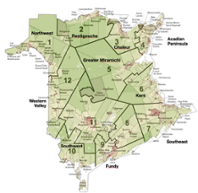 Centre Director Zack Taylor has prepared a report with M.A. student Jon Taylor in response to the Government of New Brunswick’s nationally significant initiative to reform the province’s local government system. The report is entitled Representative Regionalization: Toward More Equitable, Democratic, Responsive, and Efficient Local Government in New Brunswick.
Centre Director Zack Taylor has prepared a report with M.A. student Jon Taylor in response to the Government of New Brunswick’s nationally significant initiative to reform the province’s local government system. The report is entitled Representative Regionalization: Toward More Equitable, Democratic, Responsive, and Efficient Local Government in New Brunswick.
Today, 30% of New Brunswickers do not have elected local representation. There is widespread concern about inequitable tax burdens and sprawl around the larger cities, and some local authorities are having trouble providing core services. The report recommends strengthening New Brunswick’s 12 Regional Service Commissions along the lines of British Columbia’s regional districts, which have successfully coordinated service delivery and land-use planning in that province since the 1960s. The report describes the history and key features of the regional district model and shows how modest reforms to the Regional Service Commissions could make local governance in New Brunswick more flexible, democratic, responsive, and accountable. Past reforms which tried to amalgamate municipalities failed because they would have been highly disruptive to existing institutions. Representative regionalization would be much less disruptive because it would keep existing local governments intact while promoting more efficient and democratic decision-making at the regional level.
February, 2021 NEW PROJECT
Centre joins international project measuring local autonomy
The Centre is the Canadian partner in a multinational study of local autonomy based at the Institut de hautes études en administration publique in Lausanne, Switzerland. The Swiss team is creating a quantitative index, the Local Autonomy Index 2.0, with standardized data contributed by researchers in 61 countries. Profs. Zack Taylor and Martin Horak will prepare the Canadian dataset.
Oct. 23, 2020 NEST DISTINGUISHED LECTURE 2020
Why Cities Lose: The Deep Roots of the Urban-Rural Political Divide
Jonathan Rodden, Stanford University
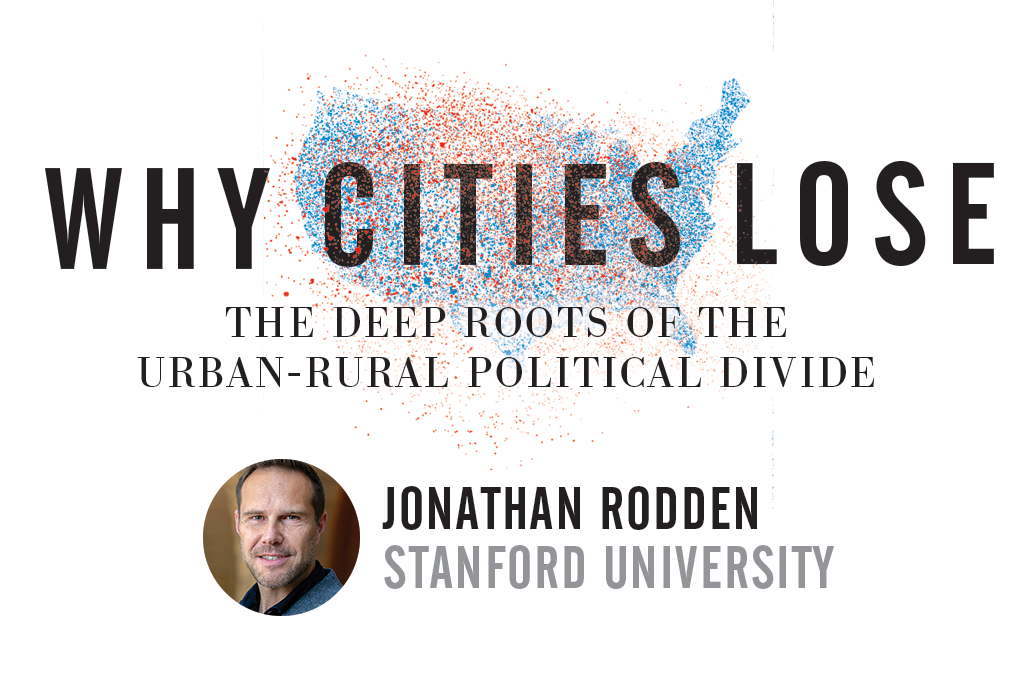 Why is support for progressive political parties concentrated in cities and support for conservatives in rural and suburban areas? Drawing on his new book, Why Cities Lose, Jonathan Rodden presents a bold new interpretation of today’s urban-rural political polarization. Many place exclusive blame on partisan gerrymandering and voter suppression. However, Rodden shows that this polarization, and the left’s electoral challenges in the United States, Canada, and other countries, have deep roots in the history of urban industrialization, and are unlikely to change without reforms to electoral systems. Please contact the Centre if you wish to view a video of the presentation and Q&A.
Why is support for progressive political parties concentrated in cities and support for conservatives in rural and suburban areas? Drawing on his new book, Why Cities Lose, Jonathan Rodden presents a bold new interpretation of today’s urban-rural political polarization. Many place exclusive blame on partisan gerrymandering and voter suppression. However, Rodden shows that this polarization, and the left’s electoral challenges in the United States, Canada, and other countries, have deep roots in the history of urban industrialization, and are unlikely to change without reforms to electoral systems. Please contact the Centre if you wish to view a video of the presentation and Q&A.
Oct. 22, 2020 NEW PUBLICATION
Administering a Ranked-Choice Voting Election: Lessons from London, Ontario
 As the provincial government moves to revoke Ontario municipalities’ power to hold ranked ballot elections, a new Centre report by graduate fellow Charlotte Kurs finds that London successfully administered its first ranked ballot election in 2018. London was the only municipality to adopt ranked ballot voting in 2018. Administering a Ranked-Choice Voting Election: Lessons from London, Ontario takes an in-depth look at how the City of London prepared for and ran a municipal election under the new system for the first time.
As the provincial government moves to revoke Ontario municipalities’ power to hold ranked ballot elections, a new Centre report by graduate fellow Charlotte Kurs finds that London successfully administered its first ranked ballot election in 2018. London was the only municipality to adopt ranked ballot voting in 2018. Administering a Ranked-Choice Voting Election: Lessons from London, Ontario takes an in-depth look at how the City of London prepared for and ran a municipal election under the new system for the first time.
The report concludes that the preparations for the election, as well as the election itself, went smoothly in London. Keys to success included systematic testing of new equipment and an extensive public education campaign. While the report does not analyze the outcomes of London’s election, it finds that 70% of London voters ranked more than one candidate, suggesting high public interest in the new system.
A webinar that includes a presentation of the report’s findings and a Q&A with senior City of London election administrators is available on YouTube.
2019–2020
Feb. 4, 2020 NEW PUBLICATION
Power and Purpose: Canadian Municipal Law in Transition
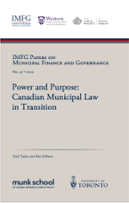 In their new report, Power and Purpose: Canadian Municipal Law in Transition, Prof. Zack Taylor and Western Political Science MA student Alec Dobson examine the state of municipal empowerment by presenting an overview of municipal law in Canada’s 10 provinces. They identify similarities and variations within and among the provinces in how they articulate the provincial-municipal relationship, municipal powers and jurisdiction, the organization of municipal institutions, and financial powers.
In their new report, Power and Purpose: Canadian Municipal Law in Transition, Prof. Zack Taylor and Western Political Science MA student Alec Dobson examine the state of municipal empowerment by presenting an overview of municipal law in Canada’s 10 provinces. They identify similarities and variations within and among the provinces in how they articulate the provincial-municipal relationship, municipal powers and jurisdiction, the organization of municipal institutions, and financial powers.
The paper is the first in a series of papers being prepared for the Urban Project, an initiative led by the Federation of Canadian Municipalities (FCM) that brings city leaders together with other levels of government, academia, civil society, and the private sector to identify actionable and scalable solutions to the biggest challenges facing Canada’s cities. The paper is co-published by the Centre and the Institute on Municipal Finance and Governance in the University of Toronto’s Munk School of Global Affairs and Public Policy.
Oct. 17, 2019 PUBLIC LECTURE
Governing Secondary City-Regions: Lessons from Manchester, UK
 Dr. Alan Harding
Dr. Alan Harding
Chief Economic Advisor, Greater Manchester Combined Authority
Visiting Professor, Manchester Institute of Innovation Research
How can secondary cities thrive in a competitive global economy in which large metropolitan centres seem to run away with growth? Dr. Harding discussed the experience of Manchester, UK, which has become an internationally recognized site of economic development policy innovation, institutional reform, and the devolution of national authority to local government. The Manchester experience offers important lessons for Canadian secondary cities, including London, Ontario.
Dr. Harding’s talk were followed by remarks from Kapil Lakhotia, President and CEO of the London Economic Development Corporation.
Co-presented with the Program in Governance, Leadership and Ethics at Huron University College and the Project on Multilevel Urban Governance
Sept. 6, 2019 PUBLIC LECTURE
Closer Than You Think? Local Governments in Spain and Canada
 Local governments in Spain and Canada are rarely (if ever) compared directly in the scholarly literature. Yet, as visiting professor Francisco Velasco suggested in his lecture, a comparative approach reveals some striking similarities in the structure and operation of these two ostensibly very different local government systems.
Local governments in Spain and Canada are rarely (if ever) compared directly in the scholarly literature. Yet, as visiting professor Francisco Velasco suggested in his lecture, a comparative approach reveals some striking similarities in the structure and operation of these two ostensibly very different local government systems.
August 16, 2019
Centre faculty receive SSHRC grants
- Centre Associate Director Godwin Arku received an Insight Development Grant for his project “ Informed Economic Development: Testing a method for better local policymaking in municipalities.” With coinvestigator Evan Cleave (University of Toronto)
- Centre Director Zack Taylor and Centre Associate Neil Bradford (Huron University College) received an Insight Development Grant for their project “Canada’s Implicit Urban Policy.” With coinvestigator Alison Smith (University of Toronto)
- Centre Director Zack Taylor and collaborator Dave Armstrong (Western Political Science) received an Insight Grant for their project “The City in Canadian Political Development.” With coinvestigator Jack Lucas (University of Calgary)
- Centre Associate Michael Haan received a SSHRC Insight Grant for his project “Sexual Orientation and the Canadian labour market: new data and new insights.” With investigators Sean Waite (Western), Nicole Denier (University of Alberta), and Andrea Wilson (Western).
July 15, 2019
Spanish local government law expert in residence at the Centre
The Centre is pleased to welcome Dr. Francisco Velasco Caballero, Professor of Administrative Law at the Universidad Autónoma de Madrid (UAM), who will be in residence as a visiting researcher between July 15 and September 10, 2019. Prof. Velasco is a leading Spanish authority on local government law and the founder and current research director of the Institute of Local Government Law (idl-UAM). During his stay, Prof. Velasco will be conducting research on urban and rural local governance in Canada. He is the first of several European researchers that the Centre will welcome over the coming years as part of a large research project on local government and the urban-rural divide ( http://www.logov-rise.eu), sponsored by the European Union.
July 4, 2019
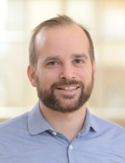 Graduate student workshop on local economic development with Dr. David Kaufmann
Graduate student workshop on local economic development with Dr. David Kaufmann
The Centre welcomed visiting scholar Dr. David Kaufmannof the University of Bern, Switzerland, who discussed his work on locational policymaking with graduate students in an interactive workshop.
July 4, 2019
Centre director featured on the Urban Land Institute's Electric Cities Podcast
Centre director Zack Taylor joined host Jeremy Warson to discuss Toronto governance and politics on the Urban Land Institute’s Electric Cities podcast. Drawing on his new book, Shaping the Metropolis , Professor Taylor explored the potential for greater municipal autonomy, arguing that Canadian advocates of big-city charters should be careful what they wish for and be clearer about what problem they are trying to solve. Founded in 1936, the Urban Land Institute is a global non-profit association of land-use professionals.
2018–2019
January 10, 2019
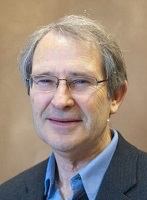 As part of the NEST’s Distinguished Speaker Series, the Centre hosted a talk by of Canada's most accomplished geographers, David Ley of the University of British Columbia, entitled A Regional Growth Machine, a Great Wall of Capital, and a Metropolitan Housing Market
As part of the NEST’s Distinguished Speaker Series, the Centre hosted a talk by of Canada's most accomplished geographers, David Ley of the University of British Columbia, entitled A Regional Growth Machine, a Great Wall of Capital, and a Metropolitan Housing Market
Vancouver was transformed by the globalization of property markets following Expo 86. A powerful growth machine developed in British Columbia as substantial Asian capital flowed into Vancouver. Prof. Ley will discuss how the B.C. government became addicted to the spinoffs from these funds, the emergence of a growth coalition composed of politicians and the real estate industry, and the deregulation of private institutions and the underresourcing of public agencies.
October 27, 2018
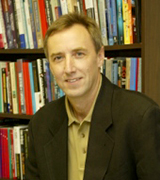 Prof. Bradford calls for an urban development agreement
Prof. Bradford calls for an urban development agreement
Faculty associate and chair of the Political Science department at Huron University College Neil Bradford calls for the revival of federal urban development agreements—multi-level, federal-provincial-municipal policy frameworks tailored to specific cities’ needs—in a commentary in the London Free Press . He argues that London would benefit from such a strategy and that local actors should mobilize for one.
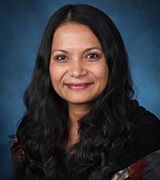 October 26, 2018
October 26, 2018
Prof. Baruah examines opportunities and constraints for promoting gender equity in green jobs
Centre Faculty Associate Bipasha Baruah will present as part of the Rotman Institute of Philosophy's Speakers Series on Global Trends in Women’s Employment in Renewable and Clean Energy: Continuities, Contradictions, Disruptions at 2:30pm–4pm in the Western Interdisciplinary Research Building, Room 1170.
October 17, 2018
Centre director talks local autonomy on The Agenda
Prof. Zack Taylor appeared on the October 17th edition of TVOntario’s The Agenda with Steve Paikin , discussing whether cities need more powers with Globe and Mail international correspondent Doug Saunders and Enid Slack, Director of the University of Toronto’s Institute on Municipal Finance and Governance.
Centre Launch Event
The Intentional City: Shaping London’s Urban Future
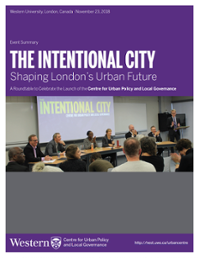 On November 23, 2018, Western’s Centre for Urban Policy and Local Governance hosted its first official event: a public roundtable on The Intentional City: Shaping London’s Urban Future. This was an important moment for the new Centre, signalling its goal of productively engaging scholars across disciplinary boundaries and building new relationships between Western researchers and the community. Indeed, roundtable participant Neil Bradford noted that “we underestimate Western, the convening power of the university as a neutral third space on issues”—and highlighted the potential for the Centre to play this role.
On November 23, 2018, Western’s Centre for Urban Policy and Local Governance hosted its first official event: a public roundtable on The Intentional City: Shaping London’s Urban Future. This was an important moment for the new Centre, signalling its goal of productively engaging scholars across disciplinary boundaries and building new relationships between Western researchers and the community. Indeed, roundtable participant Neil Bradford noted that “we underestimate Western, the convening power of the university as a neutral third space on issues”—and highlighted the potential for the Centre to play this role.
London is at a crossroads. Neither a core global city nor a place left behind, it occupies the open middle ground of Ontario’s and Canada’s urban future. What kind of future do we want for London, and how do we get there? Who should lead, and who needs to be at the table? What can London learn from other mid-size cities? Fundamentally, can London be an intentional city—one that knows what it is, knows what it wants to become, has assembled the resources, including community and intergovernmental support, to get there?
Moderated by the Centre’s associate director, Prof. Martin Horak, the roundtable brought together civic leaders and academics for an open public discussion of these questions. Five panellists participated: Pierre Filion, Professor in the School of Planning at the University of Waterloo and an expert in mid-sized cities; Arielle Kayabaga, Councillor-Elect for City of London’s downtown Ward 13; Michelle Baldwin, Executive Director of London’s Pillar Nonprofit Network and Co-Founder of Innovation Works; John Fleming, Managing Director of Planning and City Planner for the City of London; and Neil Bradford, Professor and Chair of the Department of Political Science at Huron University College.
June 8, 2018
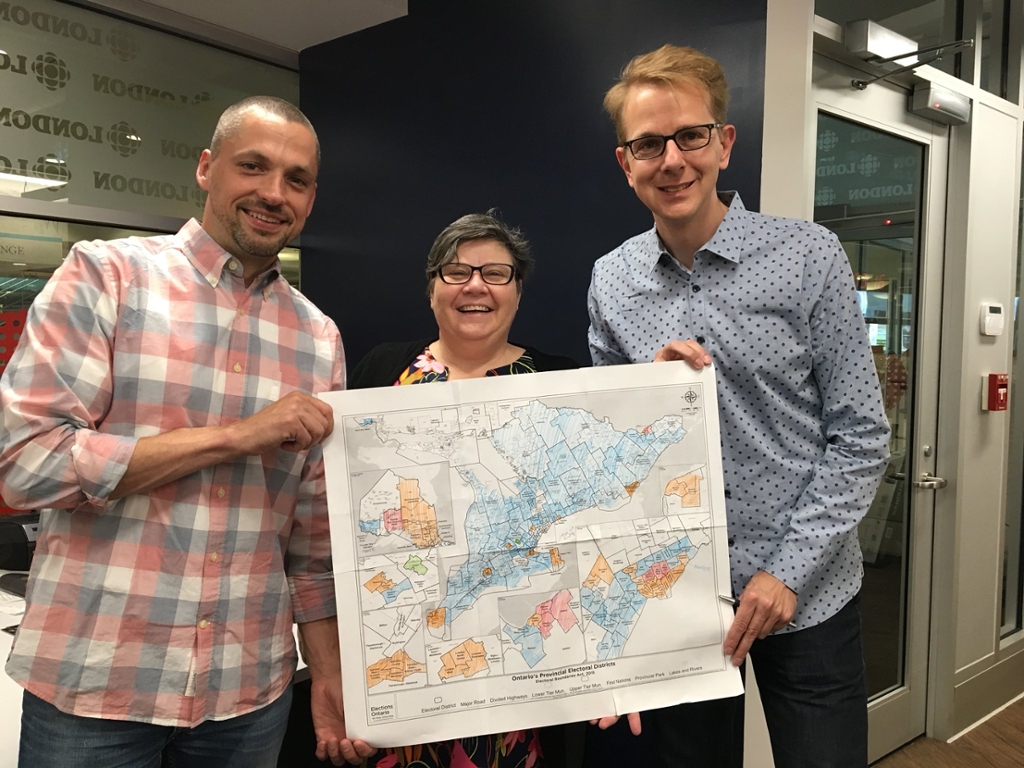 Centre director shares insights on CBC Radio panel on the Ontario election
Centre director shares insights on CBC Radio panel on the Ontario election
Professor Taylor discussed the urban dimension of Ontario politics and policy on CBC Radio London's weekly morning election panel. He was joined by King’s University College’s Jacquetta Newman and Fanshawe College’s Matt Farrell.
April 10, 2018
The Centre joins European local governance research network
The Centre is Canada’s participant in developing a multi-national project on Local Government and the Urban-Rural Divide. Each country’s research team will study the responsibilities of different levels of government, financial arrangements, and public participation in relation to the growing gap between urban and rural settlements, and to identify innovative practices to respond to these challenges.
March 27, 2018
Centre director discusses the politics of Toronto’s amalgamation on its 20 thanniversary
Professor Taylor participated in a panel discussion on “Legacies of the Megacity: Toronto’s Amalgamation 20 Years Later” organized by the Institute on Municipal Finance and Governance at the University of Toronto's Munk School of Global Affairs. He was joined by former Toronto City Manager Shirley Hoy; John Matheson, former Chief of Staff to Ontario’s Minister of Municipal Affairs and Housing; and Alexandra Flynn, Assistant Professor at the University of Toronto.
2017–2018
Taylor gives lecture at University of Manitoba’s planning school on urban resilience
March 5, 2018
Centre Director Zack Taylor gave an invited Food For Thought lecture at the University of Manitoba’s Faculty of Architecture and City Planning Program on resilience thinking in urban planning practic e. While in Winnipeg, he also met with the Partnership of the Manitoba Capital Region to talk about what the region can learn from international experience with different models of metropolitan governance.
Researchers Take on a Two-Year Study to Get Kids Walking
February 2, 2018
Geography professors Jason Gilliland and Andrew Clark are studying the environmental benefits of children walking to school instead of being driven. Ultimately, they hope to change perceptions and encourage more kids to walk to school.


